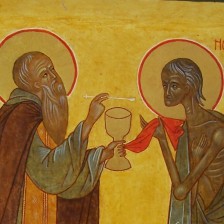
In Orthodoxy, we often hear talk about the mortification of the passions. What do we mean by this? Perhaps the Paschal season helps us to understand.
Christ destroyed death not by killing, but by voluntarily accepting his own death. Through his voluntary death, he destroyed death, and that destruction of death by death gave abundant life — life to those in the tombs!
So we don’t fight against the passions directly, we mortify them by our death to self. By our own willingness to sacrifice ourselves out of love for God and neighbour, our passions can be trampled down — not rejected, not repressed, not killed off, but overcome by the death to self that unites us with Christ’s sacrifice and brings life in abundance. “Whoever desires to save his life will lose it, but whoever will lose his life for my sake will save it.” (Lk. 9:24)
The death, or mortification, of the passions will ultimately be manifest as new life — they will rise as the powers of the soul that enable us to live and to act in union with Christ. Hence we will, by our death to self, put to death the passions and their manifestations — adultery, sexual immorality, impurity, lust, idolatry, magic, hatred, strife, selfish ambition, anger, rivalry, division, heresy, envy, murder, drunkenness, and the like (Gal. 5:20-21) — and the same powers of the soul which brought forth these deathly passions will arise in a new life of love, joy, peace, patience, kindness, goodness, faith, gentleness, and self-control (Gal. 5:22-23).
For, as St Paul writes, “those who belong to Christ have crucified the flesh with its passions” (Gal. 5:24) but what “is sown in corruption… is raised in incorruption” and what “is sown in dishonour… is raised in glory” (1 Cor. 15:42-43): “Death is swallowed up in victory! Death, where is your sting? Hades, where is your victory?” (1 Cor. 15:54-55).
Christ is risen from the dead,
Trampling down death by death,
And upon those in the tombs
Bestowing life!

You must be logged in to post a comment.